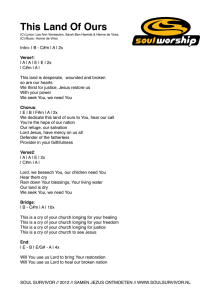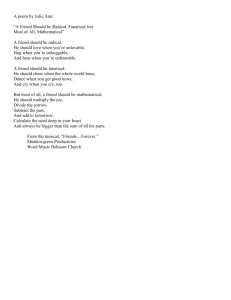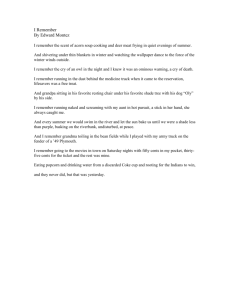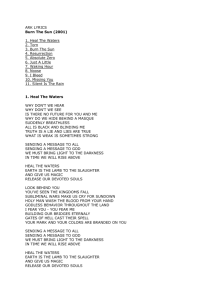Aeschylus, Agamemnon 104-257, trans. MacNiece
advertisement
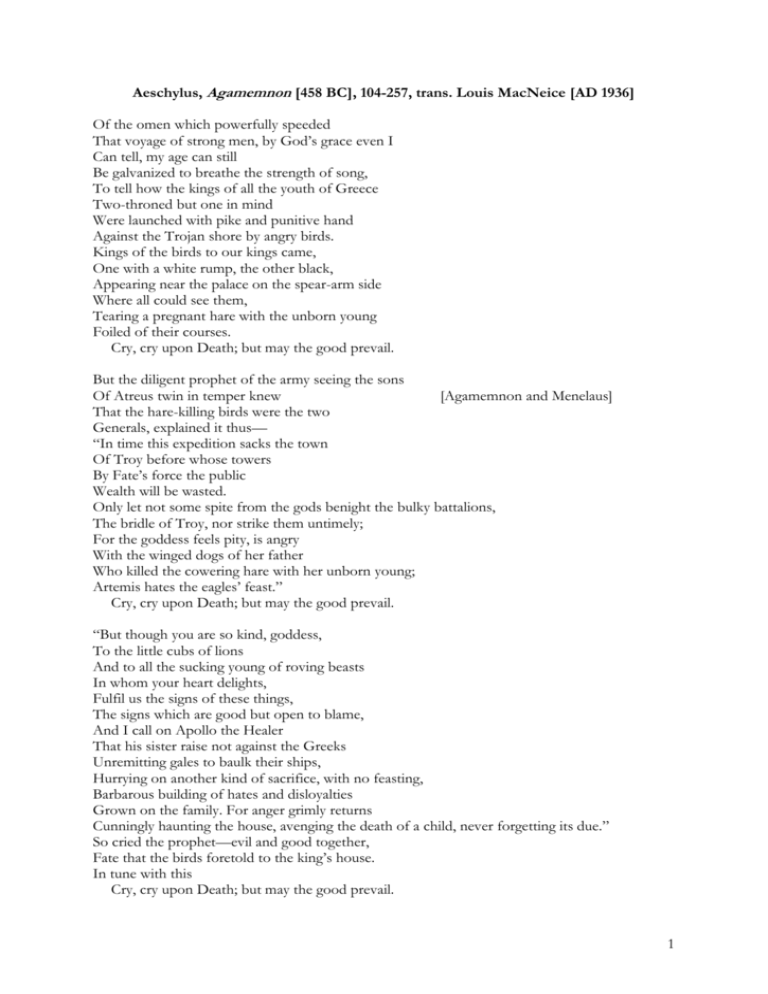
Aeschylus, Agamemnon [458 BC], 104-257, trans. Louis MacNeice [AD 1936] Of the omen which powerfully speeded That voyage of strong men, by God’s grace even I Can tell, my age can still Be galvanized to breathe the strength of song, To tell how the kings of all the youth of Greece Two-throned but one in mind Were launched with pike and punitive hand Against the Trojan shore by angry birds. Kings of the birds to our kings came, One with a white rump, the other black, Appearing near the palace on the spear-arm side Where all could see them, Tearing a pregnant hare with the unborn young Foiled of their courses. Cry, cry upon Death; but may the good prevail. But the diligent prophet of the army seeing the sons Of Atreus twin in temper knew [Agamemnon and Menelaus] That the hare-killing birds were the two Generals, explained it thus— “In time this expedition sacks the town Of Troy before whose towers By Fate’s force the public Wealth will be wasted. Only let not some spite from the gods benight the bulky battalions, The bridle of Troy, nor strike them untimely; For the goddess feels pity, is angry With the winged dogs of her father Who killed the cowering hare with her unborn young; Artemis hates the eagles’ feast.” Cry, cry upon Death; but may the good prevail. “But though you are so kind, goddess, To the little cubs of lions And to all the sucking young of roving beasts In whom your heart delights, Fulfil us the signs of these things, The signs which are good but open to blame, And I call on Apollo the Healer That his sister raise not against the Greeks Unremitting gales to baulk their ships, Hurrying on another kind of sacrifice, with no feasting, Barbarous building of hates and disloyalties Grown on the family. For anger grimly returns Cunningly haunting the house, avenging the death of a child, never forgetting its due.” So cried the prophet—evil and good together, Fate that the birds foretold to the king’s house. In tune with this Cry, cry upon Death; but may the good prevail. 1 Zeus, whoever He is, if this Be a name acceptable, By this name I will call him. There is no one comparable When I reckon all of the case Excepting Zeus, if ever I am to jettison The barren care which clogs my heart. Not He who formerly was great With brawling pride and mad for broils Will even be said to have been. And He who was next has met His match and is seen no more, But Zeus is the name to cry in your triumph-song And win the prize for wisdom. [Ouranos] [Cronos] Who setting us on the road Made this a valid law— “That men must learn by suffering.” Drop by drop in sleep upon the heart Falls the laborious memory of pain, Against one’s will comes wisdom; The grace of the gods is forced on us Throned inviolably. So at that time the elder Chief of the Greek ships Would not blame any prophet Nor face the flail of fortune; For unable to sail, the people Of Greece were heavy with famine, Waiting in Aulis where the tides Flow back, opposite Chalcis. But the winds that blew from the Strymon, Bringing delay, hunger, evil harbourage, Crazing men, rotting ships and cables, By drawing out the time Were shredding into nothing the flower of Argos, When the prophet screamed a new Cure for that bitter tempest And heavier still for the chiefs, Pleading the anger of Artemis so that the sons of Atreus Beat the ground with their sceptres and shed tears. 2 Then the elder king found voice and answered: “Heavy is my fate, not obeying, And heavy it is if I kill my child, the delight of my house, And with a virgin’s blood upon the altar Make foul her father’s hands. Either alternative is evil. How can I betray the fleet And fail the allied army? It is right they should passionately cry for the winds to be lulled By the blood of a girl. So be it. May it be well.” But when he had put on the halter of Necessity Breathing in his heart a veering wind of evil Unsanctioned, unholy, from that moment forward He changed his counsel, would stop at nothing. For the heart of man is hardened by infatuation, A faulty adviser, the first link of sorrow. Whatever the cause, he brought himself to slay His daughter, an offering to promote the voyage To a war for a runaway wife. Her prayers and her cries of father, Her life of a maiden, Counted for nothing with those militarists; But her father, having duly prayed, told the attendants To lift her, like a goat, above the altar With her robes falling about her, To lift her boldly, her spirit fainting, And hold back with a gag upon her lovely mouth By the dumb force of a bridle The cry which would curse the house. Then dropping on the ground her saffron dress, Glancing at each of her appointed Sacrificers a shaft of pity, Plain as in a picture she wished To speak to them by name, for often At her father’s table where men feasted She had sung in celebration for her father With a pure voice, affectionately, virginally, The hymn for happiness at the third libation. The sequel to this I saw not and tell not But the crafts of Calchas gained their object. To learn by suffering is the equation of Justice; the Future Is known when it comes, let it go till then. To know in advance is to sorrow in advance. The facts will appear with the shining of the dawn. But may good, at the least, follow after As the queen here wishes, who stands Nearest the throne, the only Defence of the land of Argos. 3


